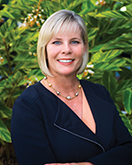 Christy Budnick
Christy Budnick
CEO
Berkshire Hathaway HomeServices
Favorite part of your job: The people I work with. I also enjoy the fact that I get to live vicariously through them when they share stories about helping their clients achieve the American Dream.
Best advice for female leaders: Don’t expect others to recognize your potential. While men don’t hesitate to speak up when they deserve an opportunity, women are often reluctant to do the same. As women, we can’t be afraid to put our hands up and ask for what we want. And, when you do a good job, make sure it’s recognized.
What would you point to as your greatest achievement since taking the helm as CEO of Berkshire Hathaway HomeServices?
Since stepping into the role, which I’ve been in for about seven-and-a-half months (at press time), the best thing I did was take the first 90 days and reach out to the broker/owners within our network—in addition to other key leaders—and ask for their feedback. I had no agenda other than wanting to hear from them in regard to what was working, what wasn’t working and what they wanted us to look at that would be good for the network as a whole. Not only was this a great opportunity to get to know a lot of people, but it also helped to shape and formulate our strategy for 2022.
Is there any specific motto or work philosophy that you live by?
There are a few, but one that I love in particular comes from my mentor Tom Petway, who said: “There are no shortcuts in life.” It doesn’t matter if it’s your business life or personal life, there is no such thing as a shortcut, and he’s absolutely right. Whenever I’m inclined to try to do something quickly or take a shortcut, his voice rings in my ear, and it was over 20 years ago that he said this to me. You have to do hard work to get the results.
Please describe your management style.
As a leader, I’ve been tasked with doing annual reviews of others, but I don’t typically get an annual review myself, even though I’m always interested in knowing what I’m doing well and where I may be falling short. That being said, over the years, I’ve asked the folks who report to me to describe my management style. Two of the words that repeatedly come up include “highly collaborative” and “decisive.” This means that I value feedback from the team on substantial decisions, and after that, I act quickly.
What is the biggest hurdle you’ve overcome as a female leader in this business?
I’ve only really encountered one hurdle in my career, and I think a lot of that goes back to my mother. A single mother of two young women, she was the breadwinner of our family, and my sister and I looked at her as a woman who blazed trails. And we didn’t know any differently. We didn’t know that women couldn’t be leaders, or that they weren’t commonly viewed as leaders. She was highly respected in our community, so we didn’t realize that this wasn’t normal.
That being said, the only time I have experienced what I would call a hurdle related to gender occurred many years ago when I attended my first board meeting for the bank I was working with at the time. During the meeting, everyone (except me) was asked to weigh in on a project and offer their opinion. After the meeting, I was told by an older male leader that rather than offering my opinion, I should listen to others and learn. Interestingly enough, some of my greatest mentors along the way have been men. And they haven’t just been mentors, but rather, key people who have advocated for me and promoted me throughout the years.
How have you helped your network agents adapt to the challenges associated with the pandemic?
We’ve doubled down on relationships. With the inventory shortage, which is more of a buyer surplus issue, inventory is replenishing, but the thirst for buyers to purchase is substantially outpacing the inventory available. Now more than ever, sellers recognize that the likelihood of seeing a real estate market like this again in their lives is about zero to none, so they’re concerned with making sure they maximize their investment. On the other side of the equation, buyers are concerned about paying too much for the home, missing out on homes or settling for a home that isn’t exactly what they’re looking for. Buyers and sellers need someone they can trust to guide them, and this is where our network agents differentiate themselves. It’s about being relationship-focused rather than transactional-focused. They recognize the benefits of further developing strong, long-lasting relationships versus buying leads and working with strangers.
How are you preparing your network agents for the future of real estate?
For agents to come into the future, they have to do more to turn their database into a client base. Allan Dalton coined the notion of turning a database into a client base, and it’s one of my favorite sayings. It means moving away from many of the traditional things REALTORS® have done in the past that put the spotlight on the agent and instead, focusing on the value we can bring to the client. I feel strongly that real estate professionals need to strive to provide as much value as other professionals—financial professionals, for example—and this is a role we as REALTORS® need to take very seriously. There’s a great deal of room to move away from focusing on marketing yourself to focusing on the client.
For more information, visit https://www.bhhs.com/.
 Paige Tepping is RISMedia’s managing editor. Email her with your real estate news ideas, ptepping@rismedia.com
Paige Tepping is RISMedia’s managing editor. Email her with your real estate news ideas, ptepping@rismedia.com












